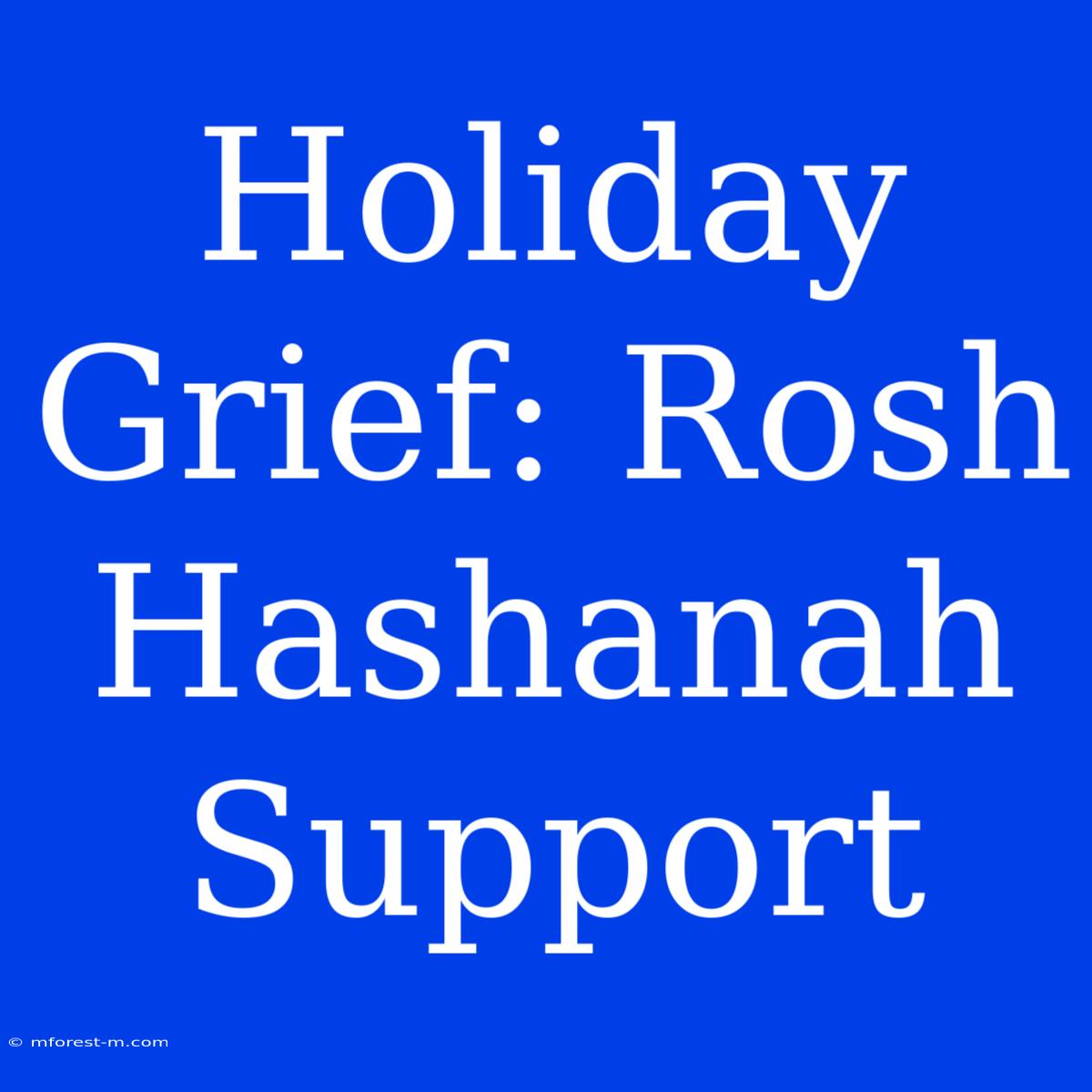Holiday Grief: Finding Support During Rosh Hashanah
What if Rosh Hashanah, a time for joy and renewal, feels more like a reminder of loss? This is a reality for many who are grieving the loss of loved ones. Navigating the holidays when hearts are heavy can be incredibly difficult, and the expectation of happiness can feel even more overwhelming. Rosh Hashanah, with its emphasis on reflection and new beginnings, can be a time for healing and remembering.
Editor Note: This article explores the challenges of navigating Rosh Hashanah while grieving and provides resources and strategies for finding support during this difficult time.
Why is this topic important? Many grapple with grief during the holidays, especially Rosh Hashanah, a time associated with family gatherings and traditions. Understanding the unique emotional landscape of grieving during this holiday season is crucial to provide meaningful support to individuals and families dealing with loss.
Our analysis: This article delves into the complex emotions that accompany holiday grief, offering practical strategies for coping and finding support. It explores various resources, including grief support groups, online communities, and religious organizations, to help individuals navigate this challenging time.
Key Takeaways of Holiday Grief During Rosh Hashanah
| Takeaway | Explanation |
|---|---|
| Grief Manifests Differently | Each person experiences grief uniquely. There is no "right" or "wrong" way to feel during the holidays. |
| Rosh Hashanah Rituals can be Triggering | Traditional elements like prayers, blessings, or even the presence of absent loved ones in memories can evoke strong emotions. |
| Seeking Support is Essential | Connecting with others who understand, be it friends, family, grief support groups, or religious leaders, can offer invaluable solace. |
Holiday Grief: Rosh Hashanah Support
Honoring the Loss
- Acknowledge the Pain: It's important to acknowledge and validate your emotions, rather than trying to suppress them. Don't force yourself to be "happy" when you're grieving.
- Create Meaningful Rituals: Find ways to incorporate your loved one's memory into Rosh Hashanah rituals. Light a candle in their honor, share a favorite story, or donate to a cause they supported.
- Find Comfort in Tradition: While some aspects might be painful, others may offer comfort and a sense of connection. Focus on the traditions that bring you solace.
Navigating Social Interactions
- Be Honest with Yourself: It's okay to set boundaries and limit social engagements if they feel overwhelming. You don't have to attend every gathering or event.
- Communicate your Needs: If you are attending gatherings, be open with loved ones about your grief and any special needs you have. Let them know how they can support you.
- Find Support Outside of Family: Grief support groups or online communities can provide a safe space to connect with others who understand what you are going through.
Seeking Professional Help
- Consult a Therapist: If you are struggling to cope with your grief, a therapist can provide professional support and guidance. They can help you develop healthy coping mechanisms and navigate the emotional complexities of loss.
- Reach Out to Religious Leaders: Many religious leaders are trained to provide spiritual and emotional support. They can offer prayers, guidance, and a listening ear.
Building Resilience
- Focus on Self-Care: During challenging times, prioritize self-care. Engage in activities that bring you peace and joy, whether it's reading, spending time in nature, or listening to music.
- Practice Mindfulness: Mindfulness techniques can help you become more present with your emotions and reduce anxiety.
- Find Meaning in Remembering: Reflect on the positive aspects of the relationship you had with the deceased. Their legacy can be a source of comfort and inspiration.
FAQ
Q: Is it normal to feel sad or overwhelmed during Rosh Hashanah when grieving? A: Absolutely. The holidays can be a time of heightened emotions and heightened awareness of loss.
Q: Should I avoid Rosh Hashanah celebrations altogether? A: It's your choice. If celebrations feel overwhelming, take time for yourself. However, if you'd like to participate, choose activities that feel comfortable for you.
Q: How can I support a loved one who is grieving during Rosh Hashanah?
A: Be present and listen without judgment. Offer practical support, like helping with meal preparation or errands. Respect their need for space, but also encourage them to seek support from others.
Tips for Finding Support
- Reach out to your synagogue or religious community: Many synagogues offer support groups and resources for those grieving.
- Connect with grief support organizations: There are numerous organizations that provide grief counseling and support groups.
- Explore online communities: Online forums and social media groups offer a sense of connection and understanding.
Conclusion
Navigating Rosh Hashanah while grieving can be challenging. Allow yourself to feel the full spectrum of emotions, seek support from others, and remember that healing takes time. Finding ways to honor your loved one’s memory and create new meaning in your life can help you navigate this difficult time.

